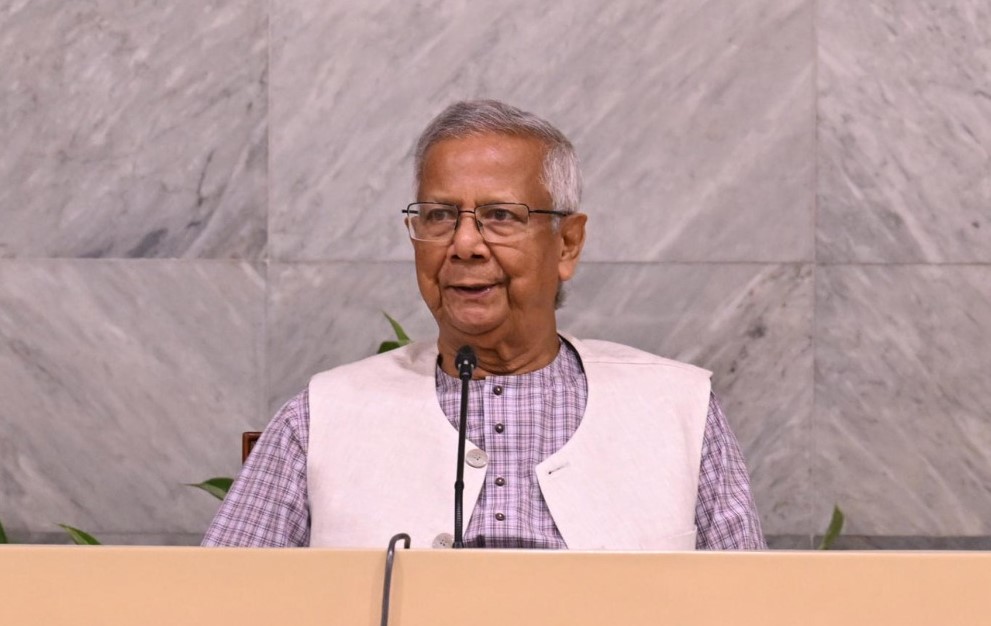The reported intention of interim administration head Muhammad Yunus to resign has become a central topic of national discussion, with most parties warning that such a move would exacerbate the ongoing crisis rather than resolve it.
Political groups have instead urged Yunus to stay the course, engage in dialogue with stakeholders, and swiftly announce a clear roadmap for electoral reforms and a credible parliamentary election to ensure democratic transition.
They also emphasized that the interim administration must operate within its constitutional mandate.
The news of Chief Adviser Yunus’s possible resignation first surfaced via the BBC Bangla service, citing Nahid Islam, convener of the National Citizen Party (NCP), who met Yunus on Thursday evening.
Nahid said Yunus expressed frustration over his ability to function amid intensifying political turmoil. However, Yunus’s press office has remained silent on the matter.
Yunus assumed office in August last year following the ouster of former prime minister Sheikh Hasina, propelled by a mass uprising.
His appointment was met with widespread public enthusiasm, and he initially received strong backing from both the civil and military administrations, as well as political parties and the general public.
However, public expectations began to fade over time, as the administration failed to restore order and improve service delivery. Persistent street protests continued to paralyse the capital.
Tensions escalated further after the government unilaterally introduced contentious policies, including a proposed humanitarian corridor for Arakan, which drew criticism from both the armed forces and political circles, with the Bangladesh Nationalist Party demanding election by December.
The government, however, maintained that the election could be arranged between December this year and June 2026, widening the gap with BNP, one of the largest political parties.
Now, in his ninth month in office, Yunus’s apparent willingness to resign has drawn reactions.
The Bangladesh Nationalist Party (BNP) has opposed any move by Yunus to step down. The party, which has ruled Bangladesh for nearly 15 years, said it prefers a ceremonial exit for Yunus after he oversees a credible election.
BNP Standing Committee member Abdul Moyeen Khan said the nation seeks a dignified exit for Yunus after he fulfils his responsibility of holding national elections.
“I would rather say, the holy wish of the people of Bangladesh is a dignified exit of Dr Yunus [and his] also honouring the trust put by our people on him for organising a free and fair election at the earliest,” he told a news agency.
Another committee member, Salahuddin Ahmed, emphasised that Yunus’s resignation would be his personal choice, not a demand of the BNP.
“If Muhammad Yunus chooses to step down instead of announcing an election roadmap, that is entirely his personal decision. We have never asked for his resignation,” he told a private broadcaster in Dhaka.
“However, if he feels personally incapable of discharging his duties, the state will not remain stagnant, it will find an alternative. No one is indispensable,” he added.
He reiterated that the only viable way forward is for the government to immediately announce an election roadmap.
Leaders of the Amar Bangladesh Party echoed this stance on Friday, opposing Yunus’s resignation amid ongoing political uncertainty.
“We oppose the resignation of Muhammad Yunus at this critical juncture. All parties must engage in dialogue to reach a consensus,” said AB Party Chairman Majibur Rahman Manju during a media briefing.
Student-led National Citizen Party (NCP) northern region coordinator Sarjis Alam, in a Facebook post, called for greater responsibility from BNP.
“At present, BNP stands as the largest political force in Bangladesh. Accordingly, people expect more from them. They must shoulder the greatest responsibility,” he wrote.
“When the only demand becomes an election roadmap, it disheartens the common citizens who took part in the July uprising. It disillusions the families of martyrs, wounded activists, and the millions who risked their lives on August 5. Their dreams are now shattered,” he added.
Bangladesh Jamaat-e-Islami’s Nayeb-e-Ameer Syed Abdullah Mohammad Taher said political tensions in the country remain high, but dialogue with political parties has helped reduce friction.
“The interim government must be preserved. Our party demands that a credible election be held under the Yunus-led government,” he said at an event in Dhaka.
“Now is the time to prioritize elections. The public’s trust must be restored. Only a fair and impartial election can resolve the crisis,” he said adding that the government had previously indicated elections would be held between December and June.
“Declare an election roadmap now,” he urged, also calling for a timeline for proposed reforms.
Poet and public intellectual Farhad Mazhar criticized Yunus’s reported decision to resign, calling it a mistake and a potentially self-defeating act.
In a Facebook post on Friday, Mazhar wrote that rather than giving in to pressure from individuals or political factions, Yunus should remain committed to the people’s historical aspirations.
“He must place his trust in the public and resist partisan influences,” Mazhar added.


